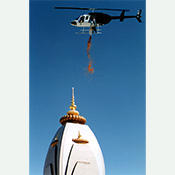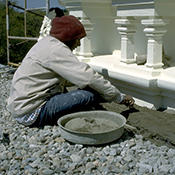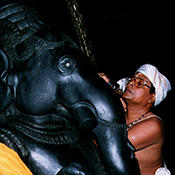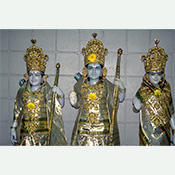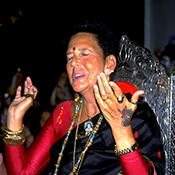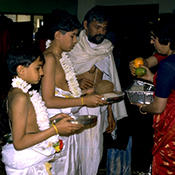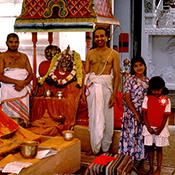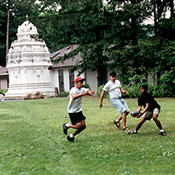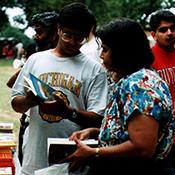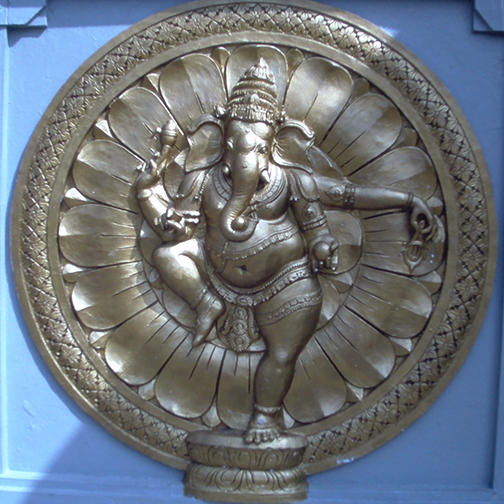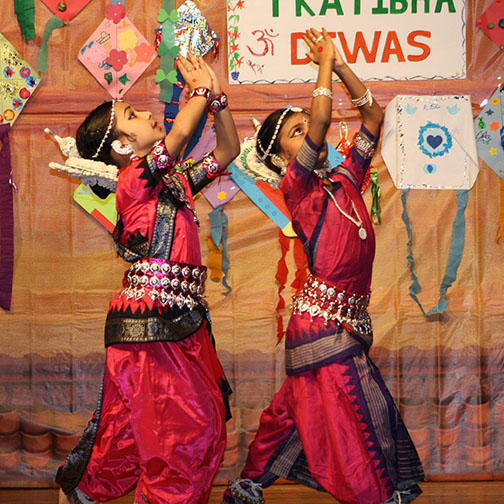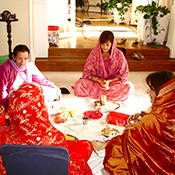 The term “Hindu” was first used by people outside of the tradition (particularly by the Greeks and the Persians) to refer to people who reside beyond the Indus/Sindhu River. Hindus today worship different deities and form complex social systems. The similarities of beliefs between Hindus include affirming that the Brahman or the Divine are always present in the universe in different forms, that it takes many lifetimes for self-realization to occur, and that one’s actions will contribute to the soul’s journey in the next life.... Read more about What Does “Hindu” Mean?
The term “Hindu” was first used by people outside of the tradition (particularly by the Greeks and the Persians) to refer to people who reside beyond the Indus/Sindhu River. Hindus today worship different deities and form complex social systems. The similarities of beliefs between Hindus include affirming that the Brahman or the Divine are always present in the universe in different forms, that it takes many lifetimes for self-realization to occur, and that one’s actions will contribute to the soul’s journey in the next life.... Read more about What Does “Hindu” Mean?
Hinduism
Hinduism
Hinduism
Essays
The Textures of Tradition
What Does “Hindu” Mean?
A Context for Diversity
Many Gods and One
Agni: The Fire Altar
Veda: Scripture and Authority
Brahman and Atman: That Art Thou
Vedanta: The Way of Wisdom
Bhakti: The Way of Devotion
Karma: The Way of Action
Dharma: The Social Order
Abodes of God: Temple and Image
The Hindu Diaspora
Home Altar
Building a Temple
Consecration: Kumbhabhishekam
Murti: The Image of God
Lamp Offerings: Hindu Worship
Ganesha: the Lord of Beginnings
Balaji: Vishnu in America
Rama, Sita, Hanuman
The Great Night of Shiva
Krishna’s Chariot Festival
Many Ma’s: Goddess in America
Ashram: The Forest Retreat
Upanayana: The Sacred Thread
Hinduism Timeline
Hinduism in the World (text)
c. 2500-1500 BCE Indus Valley Civilization
Around 2500 BCE, a sophisticated urban society emerged from the agrarian village culture of the Indus River Valley and declined, for unknown reasons, within a thousand years. The remains of the two cities of Mohenjo-Daro and Harappa reveal aspects of the Indus Valley Civilization that may have influenced the later Hindu tradition: bathing tanks, “goddess” worship, yoga-like meditation, and a Shiva-like figure.
c. 1500-1000 BCE Aryan migration
The highly mobile warrior tribes of the Aryans moved into Northwest India in successive waves between 1500-1000 BCE, encountering the remnants of the Indus Valley Civilization. The Aryans brought their own religious tradition, termed Vedism, which featured a pantheon of deities, fire offerings, and a rudimentary social hierarchy system.
c. 1400-900 BCE Composition of the Vedas
The earliest sacred literature of what came to be called Hinduism, the four Vedas, were composed orally in Sanskrit, the language of the Indo-European Aryans. The oldest of the Vedas, the Rig Veda, is a collection of hymns to the Vedic deities. The Sama Veda and Yajur Veda contain melodies for chanting the hymns and ritual formulas. The Atharva Veda is a more miscellaneous compilation, a large part of which is magical charms.
c. 1000-600 BCE Brahmanas, Aranyakas, and Early Upanishads Composed
Throughout the early half of the first millennium BCE, each of the four Vedas accumulated a tradition of secondary scriptures: the Brahmanas, Aranyakas, and Upanishads. The Brahmanas elaborated on the sacrificial rites, while the Aranyakas and the Upanishads took up the philosophical questioning first seen in the Vedas. The world-renouncer ideal also emerged in these texts.
c. 600-200 BCE Composition of the Later Upanishads
The later Upanishads were composed between 600-200 BCE. They continued to explore philosophical questions, the practice of renunciation, and knowledge of the identity of ultimate reality (Brahman) with the self (Atman). Some of these Upanishads also emphasized devotion to a personal god (theism) and the practice of yoga rather than renunciation.
500 BCE-500 CE The Consolidation of the Indic Traditions
Empires alternately rose and fell in the northern part of the Indian subcontinent between 500 BCE - 500 CE. During this time, the Buddhist and Jain traditions emerged and Hindu traditions of thought, ethics, ritual, and theism became more distinctly formulated. The epics, early puranas, law codes, and philosophical systems such as Vedanta all stem from this period.
500 BCE- 300 CE Mahabharata Legend and Epic
India’s great epic, the Mahabharata, began as a mythico-historical poem of a great war. Over centuries of oral retellings and elaborations, the Sanskrit poem grew into a vast, encyclopedic work, said to be 100,000 verses long and encompassing all of Hindu religious life. The poem is generally attributed to Vyasa, and as the Mahabharata says of itself, “Whatever is written here, may also be found elsewhere; but what is not found here, will not be found anywhere.”
500 BCE-200 CE Ramayana Legend and Epic
Although much shorter and more unified than the Mahabharata, India’s second epic, the Ramayana, is also an old story, told in brief within the Mahabharata. It underwent the same process of a lengthy period of composition (between 500 BCE - 200 CE) in which it was reworked several times. Therefore, like the Mahabharata, the Ramayana contains a wealth of Hindu lore. It is generally attributed to the poet Valmiki, and has received numerous vernacular retellings over the centuries.
c. 300-100 BCE First Evidence of Temple Worship
Inscriptions and literary sources dating from the third to first centuries BCE indicate that temples to Krishna, Vishnu, and other deities existed by this time.
c. 200 BCE-100 CE Composition of the Bhagavad Gita
The Bhagavad Gita is often considered the most famous of Hindu texts and is part of the longer epic, the Mahabharata. It is Krishna’s teaching to the warrior Arjuna at the edge of the battlefield. The teaching is a synthesis of different strands of Hindu religiosity: the wisdom of the Upanishadic tradition, the ethics of the kshatriya (warrior) tradition, and the emerging devotion to God of the bhakti tradition.
c. 100-500 CE Expansion to Southeast Asia
The Hindu tradition spread to Southeast Asia throughout the 2nd-6th centuries CE, through trade, conquest, and colonization. Hindu communities began to develop in the areas that are today Java, Sumatra, Cambodia, Burma, Malaysia, and Thailand.
c. 400 CE The Rise of Vaishnavism, Shaivism, and Shakta Traditions
The three major theistic traditions have beginnings during this time and emerge in subsequent centuries. The Vaishnava tradition focused on devotion to Vishnu, especially Krishna. The Shaiva tradition focused on devotion to Shiva, and the Shakta tradition held the Goddess as the focus of devotion. Tantrism also began to emerge during this time in Bengal, Assam, Andhra, and the Northwest.
c. 500-1300 CE Bhakti Movement and Temple Building in South India
In South India, the Nayanmars, Tamil poet-saints (6th - 8th centuries), addressed their devotions to Shiva and their work became part of the Shaiva Siddhanta canon. The Alvars (8th-9th centuries) addressed their songs and devotions to Vishnu that were collected in the Divya Prabhandam. This period marked the rise and spread of the bhakti movement in South India and temples became important as religious centers, conceived of as the dwelling places of the gods on earth.
c. 788-820 CE Adi Shankara
Shankara, an Indian philosopher, sought to unify and revive Hinduism in the face of challenges from Buddhism and Jainism from without and divisiveness from within. Propounding the Advaita (non-dualist) interpretation of the Upanishads, Shankara traveled throughout India setting up monasteries at the four compass points and establishing the lineage of Shankaracharyas at each location.
c. 848-1279 CE Chola Dynasty in Tamilnadu
The Cholas established a kingdom in Tamilnadu, which was later extended to Kerala and Sri Lanka. The Chola period saw the art of bronze casting reach its peak, leaving many beautiful temple images as a legacy. Many monuments of Hindu temple architecture were built under the Cholas.
c. 1056-1137 CE Ramanuja
Ramanuja, an Indian philosopher and social reformer, developed the Vishishtadvaita (qualified non-dualist/monist) Vedanta. A Shri Vaishnava acharya and resident head of the temple and monastery at Srirangam in South India, Ramanuja was the most influential of the Vaishnava teachers.
1336-1646 CE Vijayanagara Empire
The last Hindu empire in India had its capital at today’s Hampi in northern Karnataka. Its holdings extended as far as Malaysia, Indonesia, and the Philippines. After a major defeat in 1565 CE to the Deccan sultanates, the empire declined until 1646.
1300s-1500s Bhakti Movement in North India
Following the spread of bhakti from South India through the western and central regions, the fourteenth through sixteenth centuries CE saw the flowering of Hindi and Bengali devotional poetry in North India. Poet-saints such as Kabir, Surdas, and Mirabai became the songsters of new Vaishnava devotional movements, while Nanak’s songs became foundational to the emergent Sikh tradition.
1479-1531 CE Vallabha and Pushtimarga
Vallabha founded the Pushtimarga, or Way of Grace, emphasizing that devotion to God is an end in itself and not a means to something else. The child Krishna is primarily the focus of devotion and service; the ascetic life is rejected in favor of the householder whose pure devotion is a path to salvation.
1500s CE Portuguese in India
In the decade that Columbus sailed West to the “Indies,” the Portuguese explorer Vasco da Gama sailed around the horn of Africa to India, landing on Malabar coast of India in 1498 CE. This was the beginning of Portuguese presence in India. The colonization of Goa began with Alfonso de Albuquerque in 1510. St. Francis Xavier, the founder of the Jesuit order, arrived in Goa in 1542.
1486-1533 CE Chaitanya
Chaitanya revitalized Krishna worship in Bengal, spurring the Gaudiya Vaishnava movement. He popularized the practice of public kirtan, or chanting in praise to Krishna. Through the agency of the Gosvami clan, he also revitalized Krishna worship in Vrindavan. Some saw him as an incarnation of Krishna and his beloved Radha in a single body.
c. 1532-1623 CE Tulsidas
Tulsidas, a Benarsi Brahman, authored the Ramcharitmanas, the famous and beloved Hindi-language epic on the life of Rama. This Hindi poetry is known and memorized far and wide in North India and the story of the Ramayana of Tulsidas is enacted each fall at the Ram Lila in Banaras and in the compound of the King of Kashi across the Ganga.
1100 - 1900 CE Islamic Kingdoms in India
Various Islamic ventures into India from Central Asia and Afghanistan. Beginning with Mahmud or Ghazni and Mahmud of Ghor and then the Delhi Sultanate, followed by the Lodi Kings, then the Mughals. The Mughal period from the 16th to the 18th centuries was a high water mark of north India’s art, architecture, and culture. Muslim and Hindu relations were varied, from extreme tension to forms of Sufi mysticism that were cousins to some of the Hindu songster saints.
1500 - 1600s CE British in India
While British colonies were being established in New England and Virginia, British trading posts were also being established in India. In 1608, the first British ship landed at Surat on India’s west coast. Fort St. George, which would become the city of Madras, was established on the southeastern coast in 1644. Fort William, which would become Calcutta, was established on the Bay of Bengal in 1696.
1765-1947 CE British Raj
In Bengal in 1765, the mercantile East India Company was the defacto ruler of its large trading centers in India. It began collecting revenues, ruling the territories under British control on behalf of the Crown until 1858. In that year, the British crown took over direct rule of India, which it held until 1947.
1772-1833 CE Ram Mohan Roy
The first of the leading modern Hindu reformers, Ram Mohan Roy ushered in the Hindu Renaissance. Fluent in Sanskrit, Persian, and English he articulated a perspective which blended Hindu teachings and those of other monotheistic faiths. He was a champion of modernization and Western scientific and educational methods.
1830s CE Indian Emigration
In the wake of the abolition of slavery in the British Empire (1833), Indians emigrated throughout the empire, many as indentured laborers. The process accelerated in the 1870s as India faced population pressures and rising poverty. Indian settlements grew up in Mauritius, Fiji, Malaysia, Burma, Sri Lanka, Kenya, Tanganyika, Uganda, South Africa, Jamaica, Trinidad, and British Guyana.
1836-1886 CE Ramakrishna of Bengal
A reclusive priest at the Dakshineswar Temple near Kolkata, Ramakrishna was a devotee of Kali and recognized as an enlightened saint by Bengalis. He was sought by hundreds for his advice and blessings and was guru to a circle of disciples. After his death, his disciple Vivekananda launched the Ramakrishna Mission, advocating social reforms and religious programs, establishing schools, and building hospitals.
1869-1948 CE Mohandas Karamchand Gandhi
Employing the forms of active nonviolent resistance that he had honed in the Indian civil rights campaign in South Africa, Gandhi led the struggle in India to gain independence from British rule. He also worked to eliminate untouchability, to develop economic self-sufficiency, and to reconcile Hindus and Muslims. His faithful adherence to ahimsa, or “non-violence,” and his dedication to serving others have earned him the name “Mahatma,” or “great soul.”
1861-1941 CE Rabindranath Tagore
A Bengali poet, novelist, and playwright, Tagore won the 1913 Nobel Prize in Literature for his Gitanjali, a collection of religious poems. He began a school at Shantiniketan in Bengal and he lectured tirelessly on the dangers of chauvinistic nationalism he observed in the West.
1893 CE Swami Vivekananda at the World Parliament of Religions
Sent by his guru, Ramakrishna, to address the Parliament of the World’s Religions in 1893, Swami Vivekananda offered speeches that electrified the Chicago audience. Following the Parliament, Vivekananda spent two years traveling the U.S.,speaking and establishing Vedanta societies. He promoted nonsectarian Hinduism and religious universalism, seeking to spread Hindu values in the West but also welcoming expressions of other religions and cultures in the Vedanta centers. He returned to India with a sense of social mission, establishing the Ramakrishna Mission in 1897 to work for social uplift through relief organizations, hospitals, and schools.
1947 CE India’s Independence and Partition
The Indian freedom movement was unable to reconcile the competing claims of the secular Indian National Congress and the Muslim League. As independence from Britain was secured, India was partitioned into India and Pakistan.
1896-1977 CE Swami A.C. Bhaktivedanta Prabhupada
Swami A.C. Bhaktivedanta initiated a mission to spread Gaudiya Vaishnavism in India and throughout the world. Sent by his teacher to bring Krishna worship to the West, Bhaktivedanta arrived in New York in 1965 and quickly established a storefront Krishna temple in Manhattan. The subsequent movement became The International Society for Krishna Consciousness (ISKCON).
1960s CE Indian Gurus to the West
In the 1960s and 1970s, many gurus came to the U.S. to attract Western students. Maharishi Mahesh Yogi, Swami Bhaktivedanta, Swami Satchidananda, and Swami Muktananda are some examples. Soon some Americans, students of Indian gurus, became gurus in their own right.
1964 CE Vishwa Hindu Parishad
The Vishwa Hindu Parishad, or “World Hindu Organization,” was organized in 1964. It intended to promote consciousness and knowledge of the Hindu tradition among Hindus and to strengthen Hindu society. It also aimed to cultivate contacts with Hindus living outside India, especially in the West. In 1966, the organization held the first of what would become a series of World Hindu Conferences. In the 1980s and 1990s, the VHP became associated with “Hindu nationalist” politics in India.
1970s CE Hindus Begin Constructing Temples in the U.S.
Following a change in American immigration policy, South Asian students and professionals began coming to the U.S. in the late 1960s and 1970s. As they became settled in American cities and towns, the new immigrants began to construct temples. The first Hindu temples built in the U.S. were in Queens, New York and Pittsburgh, Pennsylvania in the 1970s.
1993 CE Vivekananda Centennial
In 1993, Hindus throughout the world observed the centennial of Vivekananda’s journey to the West. Hindu leaders from both India and America attended the centennial of the World Parliament of Religions in Chicago.
1998 CE BJP Elected to Lead India’s National Government
The Bharatiya Janata Party (BJP), or Indian People’s Party, the major opposition to the Indian National Congress, soared to political prominence with the 1998 election of Atal Bihari Vajpayee as Prime Minister of India, a position he maintained until 2004. The BJP is generally considered to be a right-wing conservative party, with a political platform that tends to support and advocate for the Hindu nationalist cause.
2007 CE Debate on Yoga in Indian Public Schools
In India, a debate was sparked in the Indian state of Madhya Pradesh over the constitutionality of teaching yoga at public schools. Advocates noted the health benefits, while some suggested that only the chanting was problematic, and critics opposed yoga education as a whole in public school settings because of its Hindu origins. In the U.S., similar debates would be taken up in later years.
2012 CE World Hindu Economic Forum
The first World Hindu Economic Forum (WHEF) was held in Hong Kong in 2012. Its mission entails striving to “make society prosperous through the generation of surplus wealth and sharing of such material wealth” by promoting development and by addressing some of the world’s larger economic challenges. The first international WHEF conference spearheaded what will include regular regional, national, and international events and research initiatives.
Present
Today, Hinduism is the world’s third-largest faith tradition. With over 1.25 billion practitioners, Hindu communities exist all across the globe. Hindu life in the contemporary world is vibrant and includes an enormous diversity of philosophies, practices, texts, rituals, art, and other cultural expressions.
Hinduism in America (text)
1780s CE Trade between India and America
Trade between India and America began in 1784 when a ship arrived in Pondicherry from Salem, Massachusetts. In the decades that followed, Indian goods became available in Salem, Boston, and Providence.
1810-20 CE Unitarian Interest in Hindu Reform Movements
The American Unitarians became interested in Hindu thought through the work of the Bengali reformer Ram Mohan Roy (1772-1833). Roy founded the reformist Brahmo Samaj which affirmed Hindu monotheism and rejected idolatry. The Brahmo Samaj, with its universalist ideas, attracted the attention of Unitarians in England and North America.
1840s CE New England Transcendentalists
The Transcendentalist movement inspired by Emerson and Thoreau included philosopher Bronson Alcott and learned preacher Theodore Parker. They took Hindu thought seriously and incorporated many Hindu ideas in their work. Thoreau’s classic, Walden, makes clear that the Bhagavad Gita accompanied Thoreau to Walden, as he embraced aspects of Hindu thought in his own life. Hindu ideas are also present in books written by Transcendentalists James Freeman Clarke (Ten Great Religions) and Samuel Johnson (The Religion of Asia).
1851 CE Salem’s Fourth of July
Trade with India increased slowly but steadily in the 19th century. In 1851, a half dozen Asian Indians marched in the East India Marine Society contingent of the Fourth of July parade in Salem.
1880-90s CE Theosophy Emerges in America
Helena Petrovna Blavatsky and Henry Steel Olcott, in their efforts to create a universal religion based on ancient scriptures, helped disseminate Hindu thought in the U.S. They believed that the Eastern traditions contained the purest kernels of this “universal religion.” Blavatsky and Olcott traveled to India and Ceylon where their movement grew considerably.
1893 CE Hindus at the World’s Parliament of Religions
At the Chicago World’s Parliament of Religions in 1893, Hindu leaders presented their teachings to American audiences for the first time. Hindus at the Parliament included Protap Chundar Mozoomdar and B. B. Nagarkar (both of the Brahmo Samaj), Narasima Chari and S. Parthacarathy Arjangar (both Vaishnavites), Mohun Dev, Manilal N. Dvivedi, and Swami Vivekananda. The powerful oratory of Swami Vivekananda (1863-1902) preaching the tolerance of Hinduism drew a phenomenal response from the audience.
1893 CE Swami Vivekananda Tours America
Immediately following the 1893 Parliament of World’s Religions, Swami Vivekandanda’s speaking tour took him to such places as Madison, Minneapolis, Des Moines, Detroit, and Memphis. Everywhere he challenged audiences with a positive, universal Hindu message.
1894 CE Vivekananda Founds Vedanta Society
Swami Vivekananda founded the first Vedanta Society in New York in 1894. His teachings focused on three main themes: the essentials of Vedanta philosophy, the unjust criticism of Hinduism by Christian missionaries in India, and the need for understanding between the East and the West. Vivekananda returned to India in 1897.
1902 CE Baba Premanand Bharati, Krishna Devotee
Baba Premanand Bharati, a Bengali follower of Krishna-devotee and saint Sri Caitanya, came to the U.S. in 1902 and founded the Krishna Samaj. He lectured in New York, Boston, and Los Angeles, where he is said to have built a Hindu temple. The Krishna Samaj was the first bhakti-oriented form of Hinduism to reach American soil, a precursor to the Hare Krishnas of the 1960s.
1906 CE First Major Hindu Temple
The first Hindu temple in North America was erected in San Francisco in 1906 by the San Francisco Vedanta Society. The temple quickly became a San Francisco landmark. It is a remarkably eclectic building, incorporating elements from a Hindu temple, a Christian church, a Muslim mosque, and an American residence.
1917 CE Asian Exclusion extended to Indians
The Asian Exclusion Act of 1917 cut off almost all immigration from India. Until 1965 when the immigration laws changed, the transmission of Hinduism to America was reduced to a trickle.
1920 CE Paramahamsa Yogananda and Self Realization Fellowship
In India in 1917, Paramahamsa Yogananda (1893-1952) founded Yogoda-Satsang. He brought it to America in 1920 when he came to Boston to attend the Pilgrim Tercentenary Anniversary International Congress of Religious Liberals, sponsored by the Unitarian Church. After the conference, Swami Yogananda stayed on, becoming the first Hindu Vedanta and Yoga teacher to settle in the United States. By 1930, he had established twelve Yogoda centers in cities across America. His movement continues today as the Self Realization Fellowship. Until 1965 when significant numbers of immigrants from India began to arrive, this movement was the largest and most extensive Hindu organization in the U.S.
1930s CE Growth of Vedanta Centers and Self Realization Fellowship
The Vedanta Society experienced a growth spurt in the 1930s and 1940s. New centers opened in Portland, Hollywood, Providence, Chicago, New York, St. Louis, and Seattle. Membership tripled in the 1930s and grew steadily until the 1950s when it leveled off again. The Self Realization Fellowship also flourished in this era. A November 1936 Literary Digest article, “Oriental Solace: Hindu Ritual of Peace and Tolerance Gains U.S. Devotees,” estimated that Swami Yogananda’s followers numbered over 25,000 during this time.
1932 CE Meher Baba to America
Meher Baba was a spiritual teacher who was born a Parsi, but became a mystic who transcended the confines of any tradition. He was seen by his followers in India and the West as an avatara or divine “descent” of God. He visited America several times during his life. While he traveled widely, his primary retreat centre was the Meher Spiritual Center at Myrtle Beach, South Carolina. For decades from the 1920s to his death in 1969, Meher Baba maintained silence and taught primarily through his writings and presence.
1937 CE World Spiritual University
Dada Lekh Raj, also called Sri Prajapita Brahma, spiritual leader of the Brahma Kumari movement in India, founded the Brahma Kumari’s World Spiritual University in India in 1937. The Brahma Kumari movement created branches of the World Spiritual University in many places, including New York. This movement is now led by the female disciples of Sri Prajapita Brahma.
1941 CE Centers Split from Vedanta Society
The Ananda Ashram in California and the Vedanta retreat center in Boston split away from the Vedanta Society and continued under the name of the Order of Ramakrishna Brahmavadin, which they carry to this day. These communities both had women lieutenants of Paramananda as their leaders, including Gayatri Devi and Sister Daya. Upon Paramananda’s death, the Ramakrishna Mission in India refused to name them as the new leaders of their respective centers, insisting that the leaders of Vedanta centers be monks trained in Calcutta.
1941 CE Christopher Isherwood Becomes a Vedantin
In 1941, the writer Christopher Isherwood joined the Hollywood Ramakrishna Vedanta Society at the age of 35 and became a lifelong student of Swami Prabhavananda. They collaborated on an English translation of the Bhagavad Gita published in 1943.
1949 CE Saiva Siddhanta in America
The Saiva Siddhanta Church was founded in 1949 when Siva Yogaswami (1872-1964) passed the mantle of spiritual succession for his lineage to Gurudeva Sivaya Subramuniyaswami, an American disciple. Subramuniyaswami returned to the U.S., practiced intense meditation, and began his active teaching in 1957 when he founded the Saiva Siddhanta Yoga Order and established the Palaniswami Temple in San Francisco, the first Hindu temple in North America performing traditional deity worship. The temple moved to Concord, California in 1989. The headquarters to Hawaii where Subramuniyaswami created a temple-monastery complex on the island of Kauai.
1950 CE Lake Shrine Opened in Los Angeles
On August 20, 1950 the Self-Realization Fellowship of Swami Yogananda formally opened its new international headquarters, “The Lake Shrine,” in Pacific Palisades, California. This 13-acre center has grown over the years to house life-size statues of Jesus and the Buddha, an artificial lake and windmill, and a gilded brass chest said to contain some of Gandhi’s ashes.
1950s CE Popularization of Yoga
Hatha Yoga, the physical yoga of breathing and postures, became popular in the U.S. in the 1950s. Yoga teachers demonstrated postures on television and bookstores carried books on yoga techniques. Hatha yoga was embraced by many people of various religious backgrounds, who sometimes had little interest in or knowledge of the spiritual underpinnings of yoga.
1952 CE Swami Yogananda Dies
The death of Swami Yogananda in 1952 attracted considerable media attention due to the attested incorruptibility of his physical body for twenty days after he died. After Yogananda’s death, several of his followers founded new organizations, including the Self-Revelation Church of Absolute Monism in Washington D.C., the Prema Dharmasala in Virginia, the Temple of Kriya Yoga in Chicago, and the Ananda Church of God-Realization.
1959 CE Maharishi Mahesh Yogi
Maharishi Mahesh Yogi arrived in America in 1959 with a simple technique of yoga meditation for popular use called Transcendental Meditation (TM). During the next ten years, he established the Spiritual Regeneration Movement in Los Angeles and branches of the Students International Meditation Society (SIMS) on hundreds of college campuses. The Beatles and Mia Farrow brought popular attention to TM.
1965 CE Immigration and Nationality Act of 1965
The Immigration Act of 1965 abolished the national origins formulae that discriminated against Asian immigrants. Now preference would be given to visa applicants whose skills were needed in the U.S. and those with professional qualifications. As a result, immigration from India and elsewhere in Asia rose dramatically and a highly educated and affluent Hindu immigrant population began to grow in the U.S.
1965 CE Bhaktivedanta and Hare Krishna (ISKCON)
A. C. Bhaktivedanta Swami Prabhupada (1896-1977) arrived in America in 1965 and founded the International Society for Krishna Consciousness (ISKCON), otherwise known as the Hare Krishna movement. Bhaktivedanta’s movement of devotion to Lord Krishna grew within a few years to include dozens of ISKCON centers. The Rukmini Dwarakadish Temple in Los Angeles, established in 1969, became the North American headquarters and flagship temple for the ISKCON movement.
1966 CE Swami Satchidananda to the U.S.
Swami Satchidananda, a disciple of Swami Sivananda in India, attracted many seekers to the discipline of yoga. He spoke to the multitudes at Woodstock in August of 1969. Satchidananda later founded the headquarters of the Integral Yoga Institute in the U.S., at Yogaville in Virginia.
1968 CE New Vrindavan Established
In 1968, ISKCON established the rural New Vrindavan community in the hills of West Virginia. Named after the popular childhood home of Krishna in India, New Vrindavan became a popular place of pilgrimage for American Hindus.
1970s CE The “Secularization” of Transcendental Meditation
In the 1970s, Transcendental Meditation (TM) began moving away from its ‘pop’ appeal and toward a scientifically verifiable means to creativity and peace of mind that was attractive to professionals. TM was billed as a technique of practice not necessarily linked to Hinduism or any other religion. The World Plan Executive Council (WPEC) was founded in 1972 to guide the spread of TM across the globe.
1970 CE Swami Muktananda and Siddha Yoga Meditation
Siddha Yoga Meditation was brought to America in 1970 by Swami Muktananda Paramahamsa (1908-1982). His ashram in Ganeshpuri, India drew many American devotees. With this two-month visit to the U.S., the movement began to grow in North America as well. Muktananda passed away in 1982 and he was succeeded by a woman disciple, Gurumayi Chivilasananda.
1970 CE Sri Chinmoy at UN
Sri Chinmoy, a disciple of Sri Aurobindo and an athlete, artist, and spiritual teacher, began to lead meditations for world peace at the United Nations in 1970. Sri Chinmoy continues to be known in the U.S. and throughout the world for his many initiatives for world peace.
1970 CE Hindu Temple Society of North America
The Hindu Temple Society of North America was incorporated in Flushing, Queens in 1970. It was the first in a new wave of American Hindu associations formed for the creation of temples. The Society worked toward the building of a temple for Lord Ganesha in Queens, consecrated in 1977.
1974 CE The Maharishi International University
The Maharishi International University was established in Fairfield, Iowa in 1974 as a degree-granting university under the auspices of the Maharishi Mahesh Yogi. The school offers bachelor’s and master’s degrees and enrolls about 700 undergraduate and graduate students.
1975 CE Chinmaya Mission West Founded
Swami Chinmayananda, a disciple of Swami Sivananda, brought his Chinmaya Mission to America in 1975. Swami Chinmayanada traveled widely, gave lectures, and sponsored summer youth camps and family camps in America until his death in 1993. Today, there are Chinmaya Mission centers in many American cities.
1977 CE Consecration of America’s First Temples
The Sri Venkateswara Temple in Penn Hills outside of Pittsburgh was consecrated with rites of Kumbhabhisekam on June 8, 1977. Its presiding deity is the form of Vishnu known as Venkatesvara, whose shrine at Tirupati in south India is a popular place of pilgrimage. Similarly, the “S.V.” temple in Pittsburgh has become an American pilgrimage place for Hindus. In the same year, the Hindu Temple Society of North America in Flushing, Queens established the Ganesha temple, which was consecrated with the rites of Kumbhabhishekam on July 4, 1977. Ganesha is the “remover of obstacles” and the guardian of the doorway or threshold.
1975-79 CE Growth of Hindu Temple Societies
During the mid- to late- 1970s, Hindu Temple Societies were formed in many cities: the Bharatiya Temple (Troy, Michigan), the Capital District Hindu Temple (Albany, New York), the Sri Meenakshi Temple (Houston), the Hindu Temple Society of Southern California (Calabasas), the Hindu Temple of Greater Chicago, the New England Hindu Temple Incorporated (Boston), and the Connecticut Valley Hindu Temple Society (Middletown). All were incorporated between 1975 and 1979 and began working toward temple construction.
1976 CE Kashi Ashram in Roseland, Florida
Kashi Ashram was established in1976 by Ma Jaya Sati Bhagavati, a Brooklyn-born guru whose spiritual journey was guided by Christ, Swami Nityananda, and her guru Neem Karoli Baba. The ashram, named for the sacred city of Kashi (Banaras or Varanasi) in India, has grown into an interfaith religious community of service built around its own “Ganges” in Florida.
1977 CE First Swaminarayan Temple
The first Swaminarayan temple in America was consecrated on August 3, 1977 in Flushing, New York. This movement of Gujarati immigrant Hindus follows the teacher Pramukh Swami, considered to be embodiment of the perfect devotee of Krishna. The movement grew rapidly with new Gujarati immigration, and within twenty-five years had over 50 centers and 8 temples.
1979 CE Vedic Heritage, Inc.
Vedic Heritage Inc. was formed by the teacher Guru Maa, who began teaching in Forest Hills, New York. By the mid-1980s she and her community had created America’s largest Hanuman Temple, located in Hempstead, Long Island.
1980s CE Rapid Growth of Asian Indian Population
In 1980 the U.S. Census first used the category “Asian Indian,” and in that year, 361,544 people chose that designation. Asian Indian immigration to the U.S. continued at a steady rate throughout the 1980s.
1985 CE Hindu Federation of America
The Hindu Federation of America was launched by Swami Premananda in the San Francisco Bay area in 1985, with its headquarters in Fremont. Its mission was to educate non-Hindus about Hinduism and promote peace among religions.
1986 CE LOTUS Temple in Virginia
In 1986, LOTUS, the Light of Truth Universal Shrine, opened at Yogaville in Buckingham, Virginia, under the spiritual leadership of Swami Satchidananda. The pink-glass lotus-shaped shrine upholds light as the universal symbol of Reality for all faiths.
1987 CE The Mahabharata on Stage and Screen
Director Peter Brook’s nine-hour rendition of the Mahabharata was staged in Brooklyn in 1987 and was later made into a film.
1987 CE The Path of Grace Comes to America
The Pushti Marga is a devotional movement emphasizing the grace and love of Lord Krishna and especially honoring Krishna as the divine child. In the late 1980s, Pushti Margya Samaj of North America started temples in New York, Pennsylvania, and Houston.
1990s CE New Hindu Temple Societies
In the 1990s, even more new Hindu Temple Societies were formed to build temples. For example, the Hindu Temple and Cultural Society of USA was established in central New Jersey and bought a large former church building in Bridgewater. The temple community grew quickly and broke ground in 1995 for a new Sri Venkateswara Temple on the site.
1991 CE Cultural Festival of India
The Cultural Festival of India, a thirty-day celebration of Indian culture, was organized by the Bochasanwasi Swaminarayan Sanstha (BSS). It took place in the summer of 1991 on the grounds of Middlesex County College in Edison, New Jersey. The festival attracted some 40,000 people every weekend for a month.
1993 CE Ashwamedha Yajna in Los Angeles
In August 1993, the Gayatri Pariwar in India sponsored a three-day “1008 Kundi Ashwamedha Yagna” in a huge parking lot of Cerritos College in Norwalk, California. 1008 sacred fires were kindled as the individuals, couples, and families sponsoring the event made offerings into the fire pits or kundis.
1993 CE Global Vision 2000
As many as 10,000 American Hindus gathered in Washington D.C. in 1993 to celebrate the centennial of Swami Vivekananda’s coming to the U.S. The gala convention hosted by the Vishwa Hindu Parishad of America (VHP) took its vision from the Sanskrit Vasudhaiva Kutumbakam, “the entire creation is one family.”
1993 CE Parliament of the World’s Religions
The Chicago-based Hindu host committee for the 1993 Parliament of the World’s Religions was active in preparations for the centennial. Hindu teachers and speakers at the Parliament included: Swami Chidananda of the Divine Life Mission; Swami Satchidananda of Yogaville, Virginia; Satguru Sivaya Subramuniswami of Hawaii; Sadguru Keshavdas of the Temple of Cosmic Religion, California; and Mother Amritanandamayi of Castro Valley, California.
1993 CE Navaratri in New Jersey
Fall Navaratri celebrations of the “Nine Nights” of the Goddess were celebrated in a huge tent in Edison, New Jersey. 10,000 people came each weekend of the event for Ras Garba dances.
1995 CE Murugan Temple of North America
Construction of a large South Indian temple dedicated to Murugan, also known as Karttikeya, began on Princess Garden Parkway in Lanham, Maryland, not far from the already thriving Siva-Vishnu Temple.
1995 CE Ashwamedha Yajna at Soldier’s Field, Chicago
On a hot weekend in the summer of 1995, more than 3000 Hindus participated in the ritual event of Ashwamedha Yajna at Soldier’s Field in Chicago. There were hundreds of fire-altars, kindled to honor the gods through the Gayatri, the most sacred of Hindu ritual mantras. The huge event was sponsored by the Gayatri Pariwar in India.
1996 CE Hinduism Today Magazine
Satguru Sivaya Subramuniyaswami upgraded the popular newspaper Hinduism Today, which he had launched in 1979, to a quarterly magazine. The magazine was published from Hawaii, where Satguru Sivaya Subramuniyaswami had created a temple- ashram. It is currently available in digital form.
1997 CE American Hindus Against Defamation
The American Hindus Against Defamation organization was founded in 1997. Over the years the group would go on to be active in protesting what they believed desecrated the Hindu tradition, such as sandals with the image of the Hindu deity Ganesha on them in 2003.
1999 CE Southern Baptist Church Prayer Guide Controversy
In 1999 just before the Hindu festival of lights, Diwali, thirty thousand copies of a prayer guide for converting Hindus were distributed by members of the Southern Baptist Church. This incident elicited national controversy and protest. On November 7th at Second Baptist Church in Houston, Texas, more than one hundred people participated in a rally that was organized by the Hindus of Greater Houston.
2000 CE Hindu Prayer in Congress
Venkatachalapathi Samuldrala, a priest belonging to the Shiva Vishnu Hindu Temple in Parma, Ohio, became the first Hindu to open a joint session of the US Congress with a Hindu invocation prayer on September 14th, 2000. Following the prayer India’s Prime Minister Atal Behari Vajpayee addressed the Congress.
2000 CE Hindu University of America Campus
Seven years after its founding, the Hindu University of America received its very own campus in Orlando, Florida, which consisted of a 9.7 acre property with two academic buildings.
2001 CE Ramayana Recitation in Pomona
Every day for over a week in June, hundreds of Hindus came to the Fairplex in Pomona, California to listen to Ramesh Oza tell the story of the ancient Hindu epic, the Ramayana.
2001 CE Aftermath of 9/11
After the tragic events of September 11th, many perpetrators of hate crimes targeted Hindus across America. For example, during the week following the attacks, two Hindu temples, one in Medinah, Illinois and the other in Matawan, New Jersey, and a convenience store owned by a Hindu man from Gujarat, India in Somerset, Massachusetts, were all firebombed.
2003 CE The Hindu American Foundation
The Hindu American Foundation (HAF), an advocacy group for Hindu Americans, was founded in 2003. The group stated that, “HAF seeks to serve Hindu Americans across all sampradayas (Hindu religious traditions) regardless of race, color, national origin, citizenship, caste, gender, sexual orientation, age and/or disability.” The following year, the HAF went on to spearhead a friend of the court brief with the United States Supreme Court in a case asking for the removal of a Ten Commandments monument from Texas State Capitol grounds.
2003 CE First White House Diwali Celebration
In 2003, the White House hosted the Hindu festival of lights, Diwali, for the first time with political advisor Karl Rove standing in for President George W Bush. Seventy members of the Indian community attended, including Dr. Sudhir M Parikh, vice-president of Indian American Forum for Political Education (IAFPE) and Gopal Khanna, CIO of Peace Corps. The event included an elaborate Indian feast and a classical Indian dance performance.
2005 CE California Textbook Controversy
In 2005, the Texas-based Vedic Foundation (VF) and the American Hindu Education Foundation (HEF) approached California’s Curriculum Commission. They asserted that the depictions of Indian history and the Hindu tradition in sixth-grade textbooks were biased against Hindus and they proposed various edits. Later that year, more Hindu organizations joined in voicing their opposition to these textbooks. Discussions with opposing scholars ensued. In 2006, a five-member Board of Education subcommittee from the California Department of Education all voted to adopt the recommendations for edits and corrections in the textbooks proposed by VF and HEF.
2009 CE Inauguration of President Barack Obama
During his inaugural address on January 20th, 2009, President Barack Obama stated, “We are a nation of Christians and Muslims, Jews and Hindus, and nonbelievers,” thus being the first president to mention America’s Hindu community in his inaugural address. The next day at the customary national prayer service at the Washington National Cathedral, Uma Mysorekar, the president of the Hindu Temple Society of North America, participated in the ceremony.
2009 CE President Obama Lights Diwali Lamp in White House
On October 15th, 2009, President Barack Obama became the first president to attend the White House Diwali celebration. He lit a ceremonial Diwali diya lamp during the half-hour event, which included a Hindi a cappella performance and a Sanskrit invocation by a local Hindu priest.
2009 CE Friendly’s Converted to Hindu Temple
Braj Mandir Temple in Holbrook, Massachusetts was dedicated on October 25th, 2009. Braj Mandir is affiliated with the Vrindavana Preservation Society (VPS), and serves 1,800 VPS members in the Quincy area. After four years of searching for a space that could accommodate its growing number of members, VPS came across a closing Friendly’s restaurant in 2006. During the next three years the old restaurant was renovated and Braj Mandir emerged, a temple devoted to Radha, the beloved of Krishna.
2011 CE First Hindu Military Chaplain
In 2011, the U.S. Department of Defense established the first Hindu Military Chaplain program in American history. Army Captain Pratima Dharm served as the first Hindu chaplain.
2012 CE First Hindu American Elected to Congress
Following her election in November 2012, Representative Tulsi Gabbard was sworn in as the first Hindu member of Congress in January 2013, taking her oath on the Bhagavad Gita.
2019 CE First Hindu American Candidate for President
In 2019, Rep. Tulsi Gabbard became the first Hindu American to run for President of the United States. Though she did not ultimately win her party’s nomination, she was a contender in the Democratic presidential primaries.
Explore Hinduism in Greater Boston
When immigrants from South Asia first came to Greater Boston, they worshipped and celebrated festivals in homes and rented halls, but eventually saw the need for temples to institutionalize and preserve their religious and cultural heritage. Today, there are close to forty Hindu religious centers in Greater Boston, including the Sri Lakshmi Temple in Ashland, which serves as a major religious pilgrimage site for a diverse community of Hindus from throughout New England.


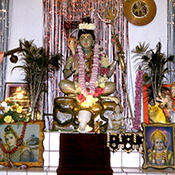

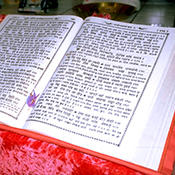



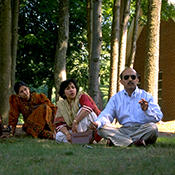


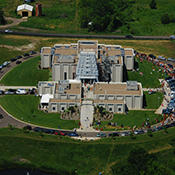



 Paramahansa Yogananda was a Hindu teacher who came to America to attend the International Congress of Religious Liberals in Boston in 1920, and stayed to found a religious movement. Yogananda promoted yoga as an intersection of science and religion that emphasized the mind-body relationship. Yogananda wrote The Autobiography of a Yogi, which was published in 1946; at the time of his passing in 1952, his organization the Self-Realizaiton Fellowship was the most prominent Hindu organization in the United States....
Paramahansa Yogananda was a Hindu teacher who came to America to attend the International Congress of Religious Liberals in Boston in 1920, and stayed to found a religious movement. Yogananda promoted yoga as an intersection of science and religion that emphasized the mind-body relationship. Yogananda wrote The Autobiography of a Yogi, which was published in 1946; at the time of his passing in 1952, his organization the Self-Realizaiton Fellowship was the most prominent Hindu organization in the United States....  The 1960s and 1970s mark the popularity of the guru or swami movement in the United States. In the late 1960s and 1970s, new streams of Hindu religious life came to the United States with the arrival of new gurus or spiritual teachers. ...
The 1960s and 1970s mark the popularity of the guru or swami movement in the United States. In the late 1960s and 1970s, new streams of Hindu religious life came to the United States with the arrival of new gurus or spiritual teachers. ... 

